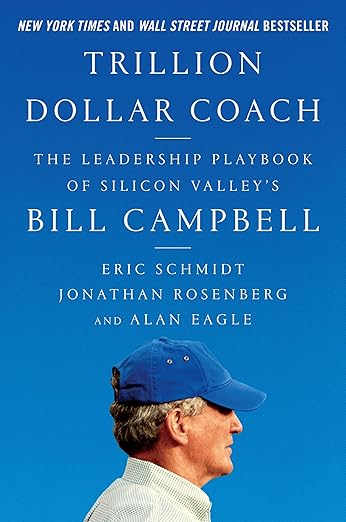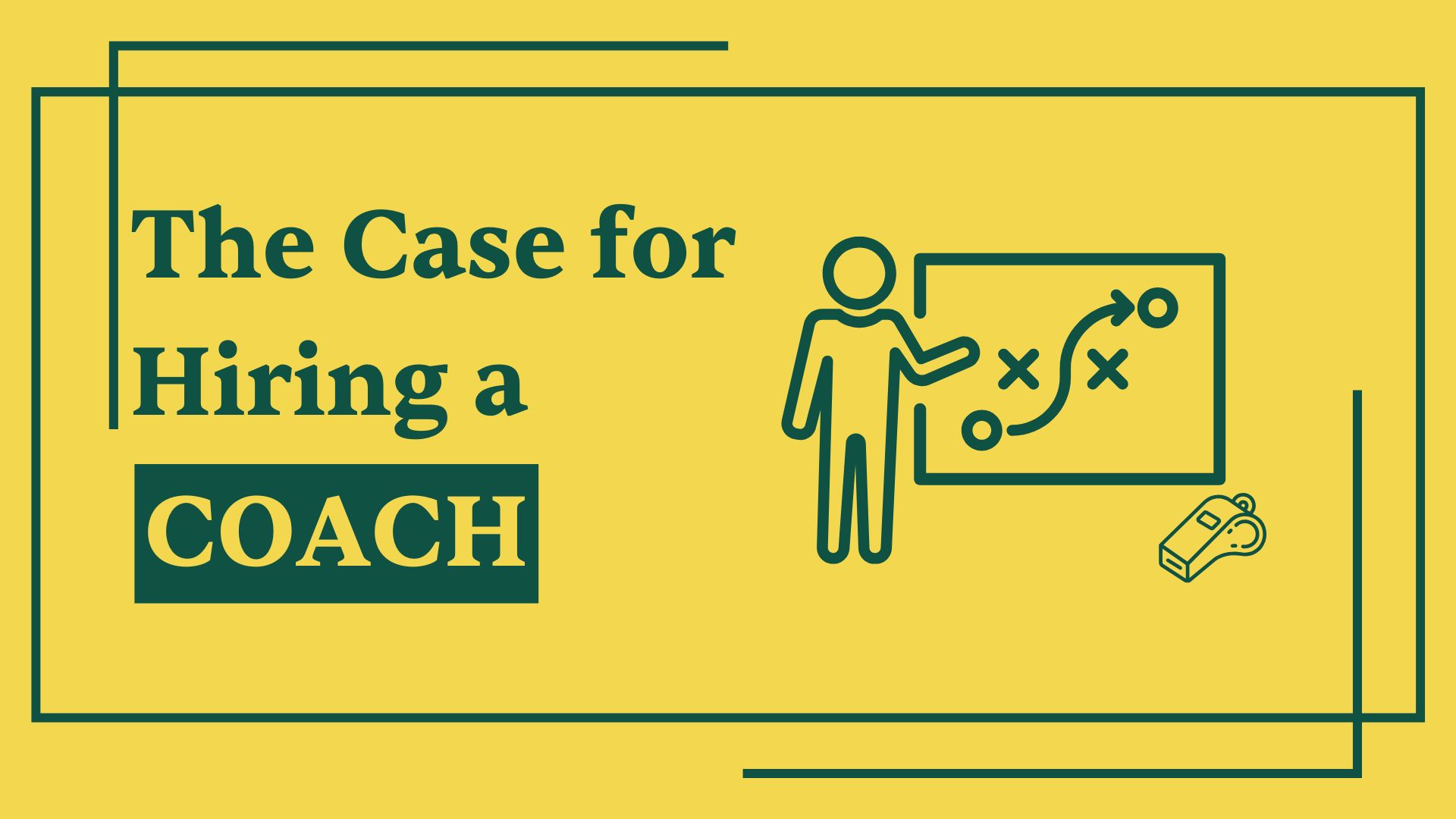Every week, there's at least one person in my inbox who sends me the same message.
It goes something like this from operators:
"Dear Regina, I want to hire you as my executive coach, but I don't have the budget to pay for it out of pocket. What can I do?"
Or, I'll get a message like this from CEOs:
"Dear Regina, I want to hire you as my executive coach, but I'm worried my investors will think it's poor use of funds. What can I do?"
-----------------------------------
Olympians have coaches. So should you.
It's quite simple, if you think about it like the Olympics.
The greatest athletes of all time all have coaches, with only a few notable exceptions. But virtually 99.99% of people who make it to Olympics territory do so with some sort of mentorship and guidance.
Simone Biles, Michael Phelps, and so many more Olympians had coaches. If you asked them, "How did you become so successful?", they would all tell you, "Persistence, dedication, and my coach."
Even though each of these athletes have raw talent in their own rights, they needed someone to nurture, guide, and mentor them along the way. They needed someone to help them with their technique, with their form, and with their agility, but they also needed someone to listen to them when times got tough, give them encouragement along the way, and tell them when they were being delusional or unreasonable.
Even if you don't like the athletes analogy, you can look at tech giants for largely the same picture.
Bill Campbell is probably the most successful and famous executive coach of all time. He is known as The Trillion Dollar Coach because he advised the likes of Steve Jobs, Larry Page, Sergey Brin, Jeff Bezos, and countless other unicorn CEOs. He was often there before they found success - he didn't just come in and ride on the coattails of their rise. He made a real, remarkable difference.

Like the Olympians, these tech founders also had raw talent. They were visionaries, technical geniuses, and operational masterminds. Whatever their domain of expertise was, they were at the Top 1% of their game. But that didn't mean they could do it without a coach. Would they have been successful? Perhaps. Would they have had the level of success they ultimately got to enjoy? I have a hard time believing so. And these founders, as smart as they were, likely saw value in their coaching relationships with Bill.
If the smartest among us need guidance from a coach, why wouldn't you?
-----------------------------------
How to Make the Case for a Coach
So how do you make the case for an executive coach?
The first and most straightforward way to make the case is to remember the invisible cost to not hiring one.
Say you are a Head of Operations or a Chief of Staff. Your job requires you to see around the corner, forecast possible challenges for your company, and act as the glue that helps the entire leadership team get along and get shit done.
The question of whether to hire an executive coach or not revolves around this simple question: What is the opportunity cost if you make the wrong decisions because you didn't work with a coach?
You can talk to any executive coach, and we'll all tell you the same thing: every company is unique, but every company also faces 99% of the same problems. We've seen it all. We have mental repositories of the countless companies going through the exact same challenge as yours right now.
Great coaches will also tell you that companies experience different flavors of the same problem. This means that while 99% of problems are universal, it is possible to think, "This isn't a new problem" and, "It feels like I'm the only one experiencing this problem as I'm currently experiencing it." Both things can be true at the same time.
Every great coach has a mental repository of what other companies have done in your situation, and what the results were. We can teach you how to avoid making the same errors. As objective third parties, we have no vested stake in lying to you or sugarcoating the truth - we are here to help your startup thrive and win, not fail (and hurt reputation in the long run.) And we can tell you different flavors of the problem you're facing, what's similar about it, and what's different. Then, we can help you with problem solving.
The TLDR here is: if you're an operator making decisions that will make your company millions in ARR through revenue as well as avoiding the most common pitfalls, how much would that be worth to you?
All of a sudden, it clicks that spending $60-80k a year on coaching that lead to millions, or even billions, in value creation and avoiding costly mistakes makes a whole lot of sense.
I remember when I was Chief of Staff to Steve Huffman's coach, Steve told him that he created a billion dollars worth of value for Reddit.
If really smart people are hiring coaches, what do you think they know that you don't?
-----------------------------------
Building a startup is really hard. Everyone knows this, and it involves especially complex emotions when you have to ride the inevitable ups and downs that come with starting a company.
Working with a coach can be extremely beneficial in helping your mental health - there is no one else in the world who has full context on what your company does and why it matters - it can be exhausting to explain over and over again to your family, loved ones, or therapist what you do for work. Your coach knows what you do, what your company does, and what the current concerns of the day are for you. Our job is to context-build.
The other benefit to your mental health is having someone you can be totally and fully honest with without scaring. You can't be this honest with any of your team because you risk scaring them off. You can't be this honest with your co-founder, especially as a CEO, because you worry about causing drama in your relationship. And you certainly can't be this honest with your investors, because you're afraid they won't participate in your next round of funding.
Coaching provides a great outlet for airing out any feelings you have in a totally confidential, judgment-free, psychologically safe place. This helps you shift out of anger, fear, and judgment, and into curiosity and creativity, both of which you need for problem-solving and doing hard things. Like building a company.
When your mental health is good, you make better decisions. It's that simple.
-----------------------------------
But what if my investors aren't game for the expense? I feel fear spending thousands on coaching. Shouldn't I save that money for hiring, finding PMF, and building?
Sure. But spending money on a coach does help you with hiring, finding PMF, and building. Having a sounding board that is truly impartial, and someone to help you with founder psyche, is exactly the kind of spend that is not super measurable, but tangible nonetheless.
Some of the best VCs I know believe in investing in executive coaching. In my role as CoS in the past, we had top-tier VCs like Alfred Lin, Pat Grady, Pete Fenton, and Vinod Khosla sending us their best portfolio companies. Why? Because they know their founders will have things they're working through that they won't feel comfortable talking to their investors about, and they want their founders to learn from the coaches who see the real fires day in and day out.
-----------------------------------
Finally, executive coaching is a no-brainer when you remember that coaching is a 100% tax-free expense. Every company I know writes it off.
The nature of the work we do in coaching sessions surrounds the decisions you make that will impact your startup. This is an easy and justifiable expense to help your company make more money. As a result, it's tax-efficient in capital expenditure. Moreover, working with a coach means retaining one as an independent contractor - coaches send your finance teams W-9s as we are 1099 contractors, so your company is not responsible for withholding any employment taxes.
Like marriage or relationship counseling, CEO <> Leadership relationships are best preserved and grown when everyone has a healthy outlet they can voice their problems to and release fear and anger, rather than reacting in a triggered state. It is highly beneficial to learn from someone who has been a successful operator and has understood the fundamentals of operational excellence from the very beginning.
Working with an executive coach follows the same reasons why virtually every successful athlete has a coach. You don't get to the Olympics alone.





